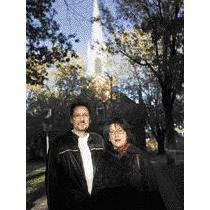 I stumbled across this excellent reflection on deacons and it’s too good not to share. It’s by Archbishop John Vlazny of Portland, Oregon:
I stumbled across this excellent reflection on deacons and it’s too good not to share. It’s by Archbishop John Vlazny of Portland, Oregon:
“What can I do for you?” With those words Archbishop John Foley began his homily in St. Peter’s Basilica on Oct. 4 as he prepared to ordain 21 men to the diaconate. One of them was our own Rev. Mr. Theodore Lange from St. Joseph Parish in Salem. Two others were from Australia, and the rest were from dioceses across the United States. One deacon reminded me after the ceremony that he had sung “Happy Birthday” to me back 10 years ago when I was still in Winona. Another had been a college quarterback. All received the gift of the diaconate with the hope of being ordained to the ministerial priesthood in the not-too-distant future.
The archbishop’s question set the tone for the entire ritual, “What can I do for you?” It’s a very appropriate approach for all pastoral ministers, especially deacons. A deacon by virtue of his ordination is asked by the church to embody Christ the servant, the Son of God who was a marvelous teacher and wonder-worker but delighted in washing feet, feeding the hungry, comforting and healing the sick and consoling the grieving. Pastoral service requires familiarity with the needs of the people. Deacons should be on the frontline when it comes to knowing what God’s people need. But all pastoral ministers, priests and bishops included, share that responsibility.
The question is a good one for all of us who are called to lead a faith community. Too often we tend to begin, not by asking the archbishop’s question, but by telling people what we have come to do for them. After all, pastoral ministers do have their own ideas about what they would like to do and what might serve the people’s needs best. But we can waste much time and spin all kinds of wheels if we never learn what the people are hoping we can do for them.
The ministry of deacon is uppermost in my mind during these autumn days of 2007. My participation in Deacon Theodore’s ordination in Rome will soon be followed by the ordination of six men of this diocese to the permanent diaconate at the cathedral on Saturday, Nov. 3. Then on Dec. 15, I will also have the opportunity to ordain as deacons two of our seminarians who are in the final stages of their preparation for the priesthood, Fred Anthony and Tom Layton, both of whom hail from Coos Bay and are presently studying at Sacred Heart School of Theology in Hales Corners, Wis.
My own ordination to the diaconate took place back on Oct. 29, 1961, in the Church of the Twelve Apostles in Rome. Two months later I was ordained a priest. That transition was too quick but that’s how it was in those days. Back then I could have used a little more time to ponder the importance of service in my own life as an ordained minister. The men ordained in Rome earlier this month were blessed to be called to that sacred order on the feast of St. Francis of Assisi, who was also a deacon. St. Francis is renowned for his life of poverty and humility. He willingly left everything behind, including family riches and great opportunities for worldly success, to model the servant ministry and simplicity of life which was the hallmark of Jesus himself. We are grateful for those Franciscans among us who still give witness to these values by their own consecration.
Continue at the link for more on what the ordination to deacon entails — and for thoughts on permanent deacons. It’s a worthwhile reminder of what this blessed ministry is all about.

